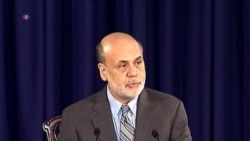U.S. stock prices reached new highs Wednesday after the U.S. Federal Reserve said it would stay the course on efforts to stimulate the economy. And that rally could continue, despite the central bank's conclusion that the U.S. economic recovery still has a way to go before it becomes fully sustainable. Many economists were expecting the Fed to start scaling back its bond purchases this month as the economy recovers from the worst recession in decades.
Top central bank officials concluded two days of meetings Wednesday by doing something completely unexpected - nothing.
Federal Reserve Chairman Ben Bernanke summed up their findings - saying there would be no immediate change.
“As you already know from our statement, the committee decided today to keep the target range for the federal funds rate at zero to one-fourth percent and to make no change in either its asset purchase programs or its forward guidance regarding the federal funds rate target," said Bernanke.
The Federal Reserve has been buying $85 billion in bonds a month to stimulate the economy by keeping interest rates low.
Financial markets reacted almost instantly - sending stock prices sharply higher.
Not surprising says economics professor Steven Kyle. He spoke to VOA via Skype.
“Well, in the stock market, they’re happy because that means that long-term interest rates will stay low. That’s a good thing for stocks, and they can keep the party going a while longer," said Kyle.
But the decision to maintain the stimulus package confirms that the U.S. economy is not as robust as many hoped. Bernanke says the job market remains weak.
“Notably, at 7.3 percent, the unemployment rate remains well above acceptable levels. Long-term unemployment and underemployment remain high," he said.
Economist Joseph Gagnon at the Peterson Institute had predicted the tapering would not happen this month, partly because of intense market speculation, and partly because of the tepid economy.
“Things are not looking as good as they were three months ago, the last time they did a forecast. And part of that is the higher interest rates, which have risen because of this talk about tapering itself, is making the economy worse," said Gagnon.
Some say it’s not a question of when the Fed will start tapering but by how much.
That could be more difficult given expectations that Bernanke will step down as Fed chairman when his term ends in January - says the Concord Coalition's Robert Bixby.
“It’s going to be a difficult job because you’re essentially unwinding a policy that somebody put in place and that’s a difficult challenge," said Bixby.
Market experts say a more immediate problem may not be the size of the taper but whether Congress is able to agree on government spending levels or the size of the U.S. debt when budget negotiations begin later this month.
Top central bank officials concluded two days of meetings Wednesday by doing something completely unexpected - nothing.
Federal Reserve Chairman Ben Bernanke summed up their findings - saying there would be no immediate change.
“As you already know from our statement, the committee decided today to keep the target range for the federal funds rate at zero to one-fourth percent and to make no change in either its asset purchase programs or its forward guidance regarding the federal funds rate target," said Bernanke.
The Federal Reserve has been buying $85 billion in bonds a month to stimulate the economy by keeping interest rates low.
Financial markets reacted almost instantly - sending stock prices sharply higher.
Not surprising says economics professor Steven Kyle. He spoke to VOA via Skype.
“Well, in the stock market, they’re happy because that means that long-term interest rates will stay low. That’s a good thing for stocks, and they can keep the party going a while longer," said Kyle.
But the decision to maintain the stimulus package confirms that the U.S. economy is not as robust as many hoped. Bernanke says the job market remains weak.
“Notably, at 7.3 percent, the unemployment rate remains well above acceptable levels. Long-term unemployment and underemployment remain high," he said.
Economist Joseph Gagnon at the Peterson Institute had predicted the tapering would not happen this month, partly because of intense market speculation, and partly because of the tepid economy.
“Things are not looking as good as they were three months ago, the last time they did a forecast. And part of that is the higher interest rates, which have risen because of this talk about tapering itself, is making the economy worse," said Gagnon.
Some say it’s not a question of when the Fed will start tapering but by how much.
That could be more difficult given expectations that Bernanke will step down as Fed chairman when his term ends in January - says the Concord Coalition's Robert Bixby.
“It’s going to be a difficult job because you’re essentially unwinding a policy that somebody put in place and that’s a difficult challenge," said Bixby.
Market experts say a more immediate problem may not be the size of the taper but whether Congress is able to agree on government spending levels or the size of the U.S. debt when budget negotiations begin later this month.





